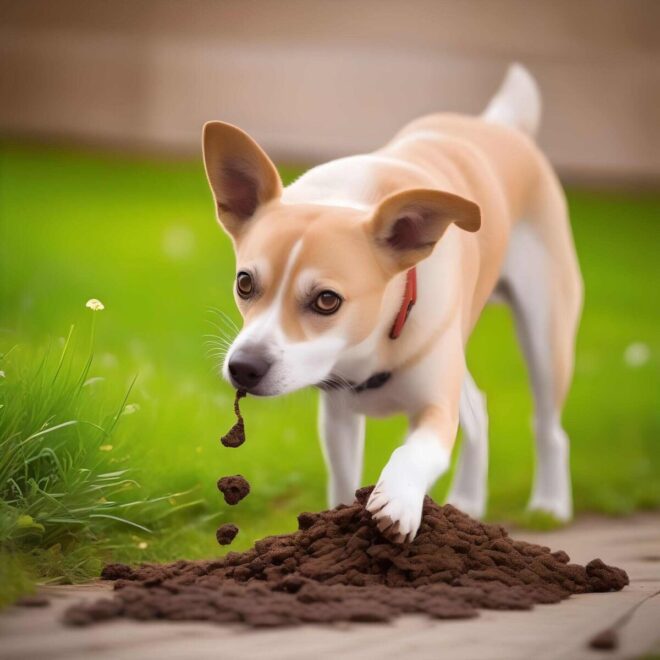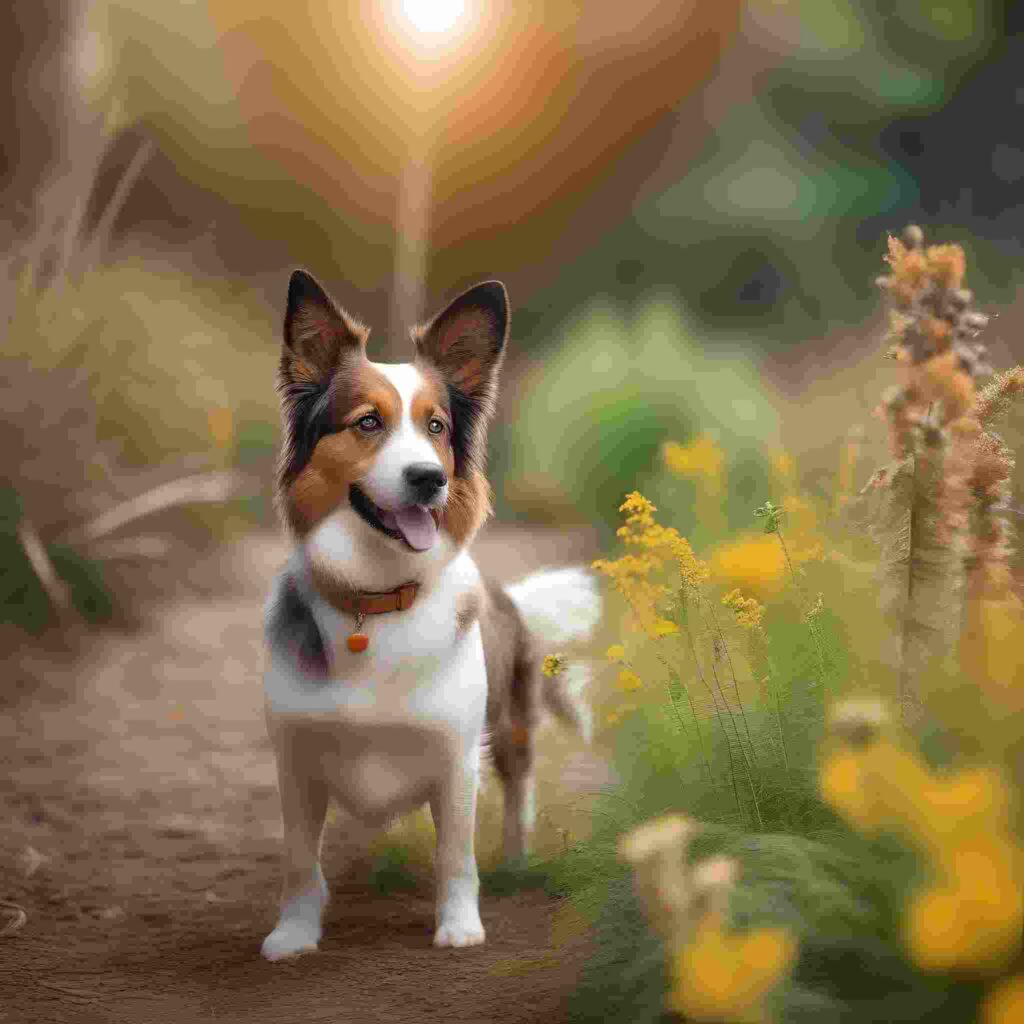
It’s a common and confusing behavior seen in many dogs – the infamous poop eating or coprophagy. If you’re a dog owner, you’ve probably observed this behavior before and asked yourself, “Why on earth would my furry friend do this? In this comprehensive blog article, we look at the different reasons why dog eats poop. examines both biological and behavioral factors. Buckle up as we unravel the secret behind this strange dog behavior.
Table of Contents
Why Dog Eats Poop?
Understanding Coprophagy:

Before we explore the reasons behind coprophagy, let’s understand what it is. Coprophagy is a scientific term that refers to dogs ingesting their own feces, the feces of other dogs, and even the feces of other animals. Although it may be concerning for pet owners, it is important to approach this behavior with an open mind and consider the various factors that contribute to it.
1. Natural Instinct:
One of the main reasons why dog eats poop stems from their evolutionary history. In the wild, dogs are carrion eaters and often had to eat whatever they could get their hands on to survive. This instinct is passed on to domesticated dogs, causing them to explore and sometimes ingest feces. This behavior may be an attempt to extract additional nutrients or satisfy an instinctive urge to forage.
2. Nutrient deficiencies:
If your dog is not getting enough nutrients from their regular diet, they may resort to coprophagy to replace the missing nutrients. This is especially common in puppies and dogs with poor quality diets. It is important for pet owners to ensure that their dogs are fed a balanced and nutritious diet to reduce the likelihood of this behavior.
3. Learned Behaviors:
Dogs are keen observers and often learn by imitating the actions of other dogs or people. When puppies see their mother cleaning up after themselves and eating poop, they are likely to accept the behavior as normal. If a dog witnesses other dogs in the house suffering from coprophagia, he or she may want to try coprophagia as well. This learned behavior can spread within flocks and households.
4. Attention-Seeking Behavior:
Dogs love to interact and receive attention from their owners. If a dog suffers from coprophagia and receives a strong reaction from the owner the dog may interpret this as a warning, even if it is negative. In some cases, dogs repeat the same behavior over and over to elicit a response from their owners, and the cycle becomes reinforced.
5. Medical Questions:
Certain diseases can cause coprophagia in dogs. Malabsorption issues, enzyme deficiencies, or gastrointestinal issues can cause food to be incompletely digested, leaving nutrients in the feces that can attract your dog. Additionally, parasites and other health issues can cause discomfort, and dogs seek relief by eating their feces.
6. Stress and Anxiety:
Stress and anxiety can manifest in many ways in dogs, and coprophagy may be a coping mechanism. Changes in environment, lack of mental stimulation, and separation anxiety can cause this behavior. Understanding and treating the underlying stress factors can help alleviate coprophagia in these cases.
7. Boredom:
Dogs, especially those left alone for long periods of time, may engage in coprophagy out of sheer boredom. Dogs need mental and physical stimulation to stay happy and healthy. Without a proper outlet for their energy and curiosity, they may turn to undesirable behaviors such as eating feces for fun.
How to Deal with and Prevent Coprophagia:
Now that we’ve looked into the causes of coprophagia, let’s talk about how to deal with and prevent this behavior in your dog:
1. Eat a Balanced Diet Provided by:
Make sure your dog is getting proper nutrition. A balanced diet that is appropriate for your age, body size, and health condition. A high-quality dog food that contains essential nutrients can reduce the likelihood of coprophagia related to nutrient deficiencies.
2. Regular Veterinary Exams:
Schedule regular veterinary exams to monitor your dog’s overall health. If coprophagy persists or is accompanied by other worrisome symptoms, consult your veterinarian to rule out any underlying medical problems.
3. Behavioral Training:
Implement consistent positive reinforcement-based training to prevent coprophagia. Once your dog shows interest in poop, reward the desired behavior and get your dog’s attention. Avoid punishment as it can cause stress and anxiety and worsen the behavior.
4. Provide a stimulating environment:
Provide mental and physical stimulation to keep your dog from getting bored. Interactive toys, regular playtime, and walks can help keep your dog occupied and reduce the likelihood of him resorting to coprophagy out of boredom.
5. Clean Up Immediately:
Cleaning up after your dog right away is one of the best strategies to avoid coprophagy. Remove feces from the area before your dog examines or eats it. This simple exercise can help break the cycle of reinforcement and discourage the behavior.
Conclusion:
Coprophagy can be a mysterious and unpleasant behavior, but understanding the reasons behind it can help pet owners address and prevent this problem. Whether due to natural instinct, learned behavior, or an underlying health issue, dealing with coprophagia requires a multifaceted approach. By eating a balanced diet, treating underlying medical issues, and incorporating positive reinforcement training, pet owners can help their dogs break this habit and lead healthier, happier lives. Can assist you. Remember that patience and consistency are extremely important when dealing with behavioral issues in our beloved four-legged friends.
Why Dog Eats Poop?
Q1: Is it normal for dogs to eat poop?
A: Yes, coprophagia, or the act of dogs eating poop, is a relatively common behavior. While it may be unsettling for pet owners, various factors such as natural instincts, learned behaviors, or nutrient deficiencies can contribute to this habit.
Q2: Can a balanced diet prevent coprophagia in dogs?
A: Providing a balanced and nutritionally complete diet is crucial in reducing the likelihood of coprophagia associated with nutrient deficiencies. Ensuring your dog receives proper nutrition can address one of the potential triggers for this behavior.
Q3: How can I discourage my dog from eating poop?
A: Positive reinforcement-based training is an effective way to discourage coprophagia. Rewarding desirable behaviors, redirecting your dog’s attention, and avoiding punishment can help break the cycle and encourage alternative, more appropriate behaviors.
Q4: Are there medical reasons behind coprophagia in dogs?
A: Yes, certain medical conditions such as malabsorption issues, enzyme deficiencies, or gastrointestinal problems can contribute to coprophagia. If the behavior persists or is accompanied by other concerning symptoms, consulting with a veterinarian is advisable to rule out any underlying health issues.
Q5: Can stress or anxiety lead to coprophagia in dogs?
A: Yes, stress and anxiety can be contributing factors to coprophagia. Changes in the environment, a lack of mental stimulation, or separation anxiety may trigger this behavior. Identifying and addressing the underlying stressors can help mitigate coprophagia in dogs.
